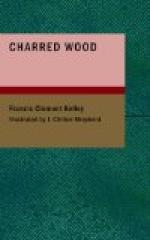“No, it wasn’t the Catholic Church in particular. When we worldlings say ‘the church,’ we mean religion in general, perhaps all Christianity in general and all Christians in particular.”
“I know.” The priest’s voice held a touch of sorrow now. “I hope you will pardon me, Mr. Griffin, if I say one thing that may sound controversial—it’s just an observation. I have noticed the tendency you speak of; but isn’t it strange that when people go looking into the question of religion they can deliberately close their eyes to a ’City set upon a Mountain’?”
“I don’t quite—”
“Get me?” Father Murray laughed. “I know that you wanted to use that particular expressive bit of our particularly expressive slang. What I mean is this: People study religion nowadays—that is, English-speaking people—with the Catholic Church left out. Yet she claims the allegiance of over three hundred million people. Without her, Christianity would be merely pitiful. She alone stands firm on her foundation. She alone has something really definite to offer. She has the achievements of twenty centuries by which to judge her. She has borne, during all those centuries, the hatred of the world; but to-day she is loved, too—loved better than anything else on earth. She has hugged the worst of her children to her breast, has borne their shame that she might save them, because she is a mother; yet she has saints to show by the thousands. She has never been afraid to speak—always has spoken; but the ages have not trapped her. She is the biggest, most wonderful, most mysterious, most awful thing on earth; and yet, as you say, those who study religion ignore her. I couldn’t, and I have been through the mill.”
Mark shifted a little uneasily. “I can’t ignore her,” he said, “but I am just a little bit afraid of her.”
“Ah, yes.” The priest caught his pipe by the bowl and used the stem to emphasize his words. “I felt that way, too. I like you, Mr. Griffin, and so I am going to ask you not to mind if I tell you something that I have never told anyone before. I was afraid of her. I hated her. I struggled, and almost cursed her. She was too logical. She was leading me where I did not want to go. But when I came she put her arms around me; and when I looked at her, she smiled. I came in spite of many things; and now, Mr. Griffin, I pay. I am alone, and I pay always. Yet I am glad to pay. I am glad to pay—even here—in Sihasset.”
Mark was moved in spite of himself. “I wonder,” he said softly, “if you are glad, Monsignore, to pay so much? Pardon me if I touch upon something raw; but I know that you were, even as a Catholic, higher than you are now. Doesn’t that make it hard to pay?”




